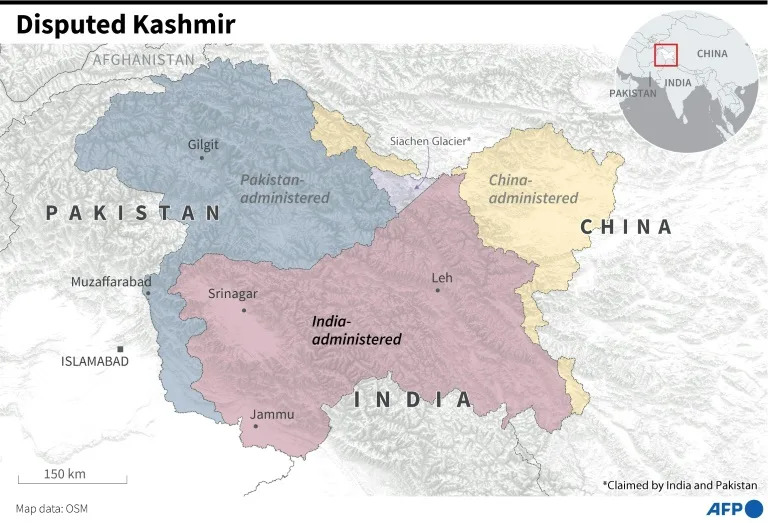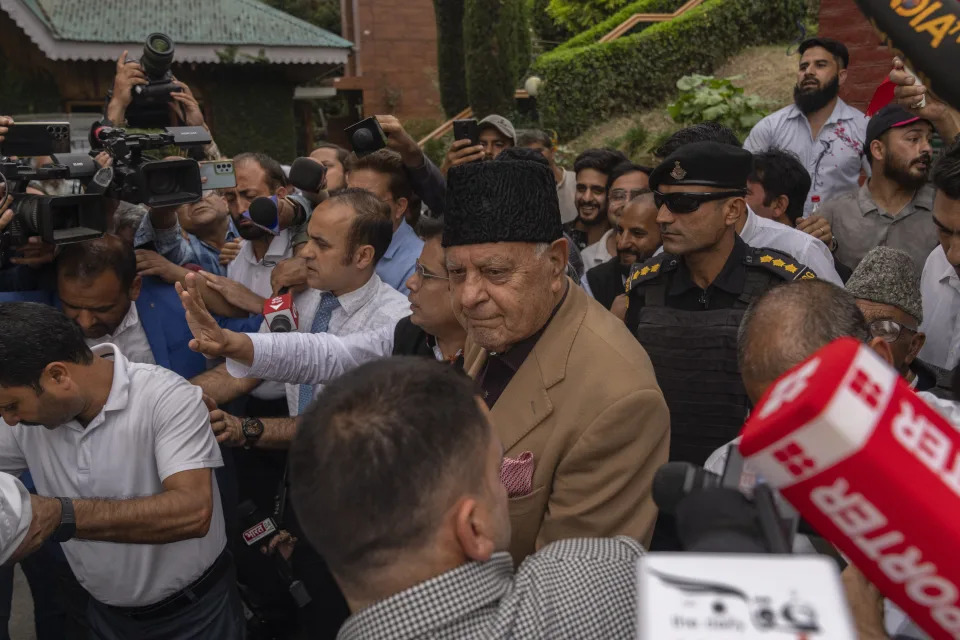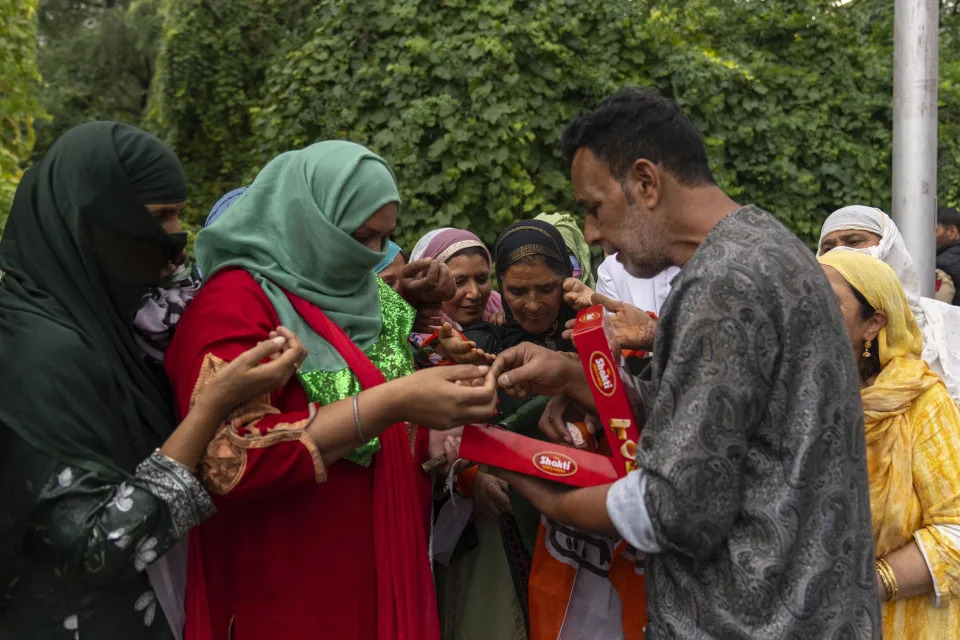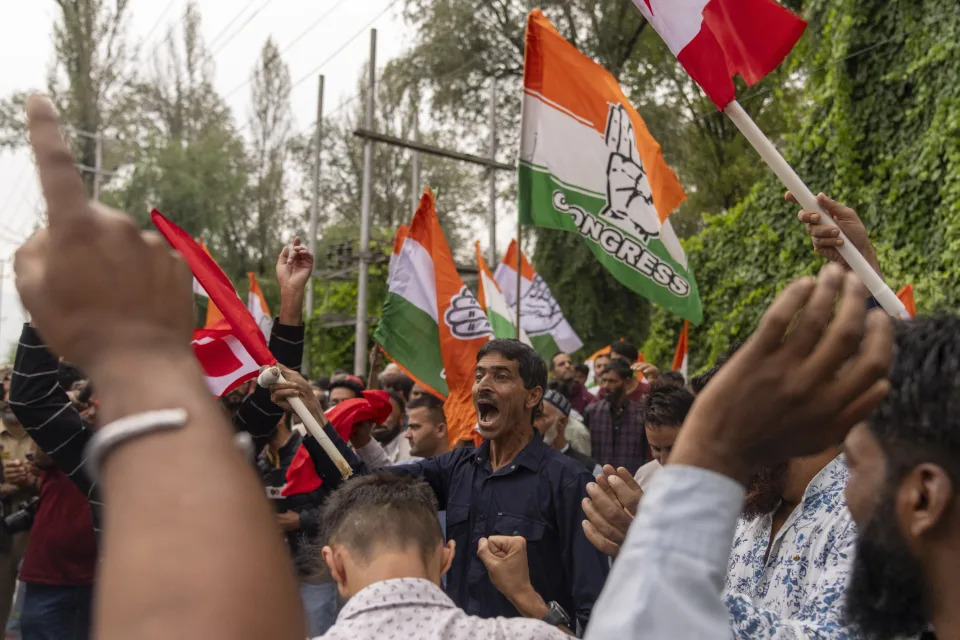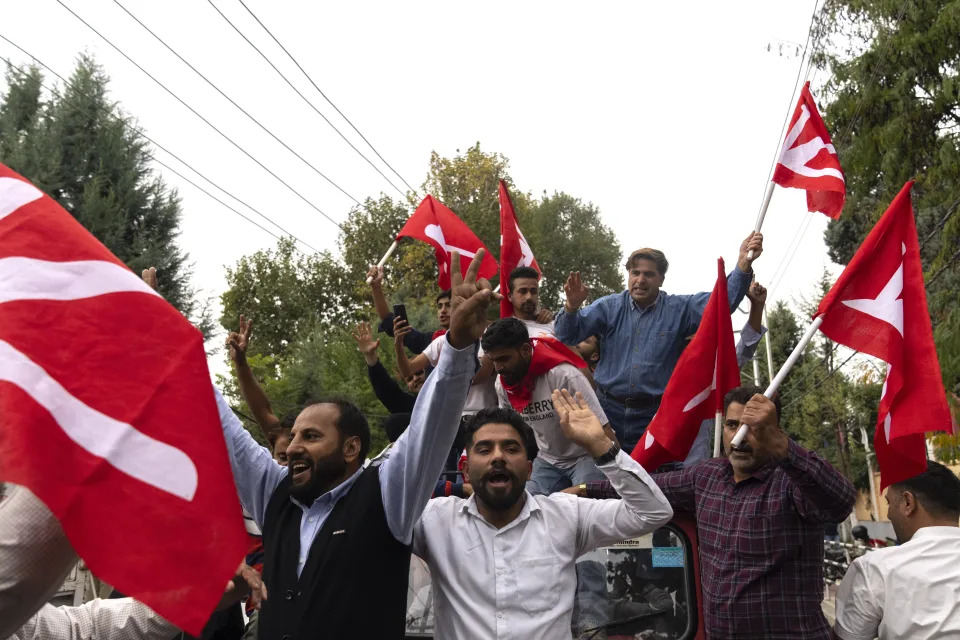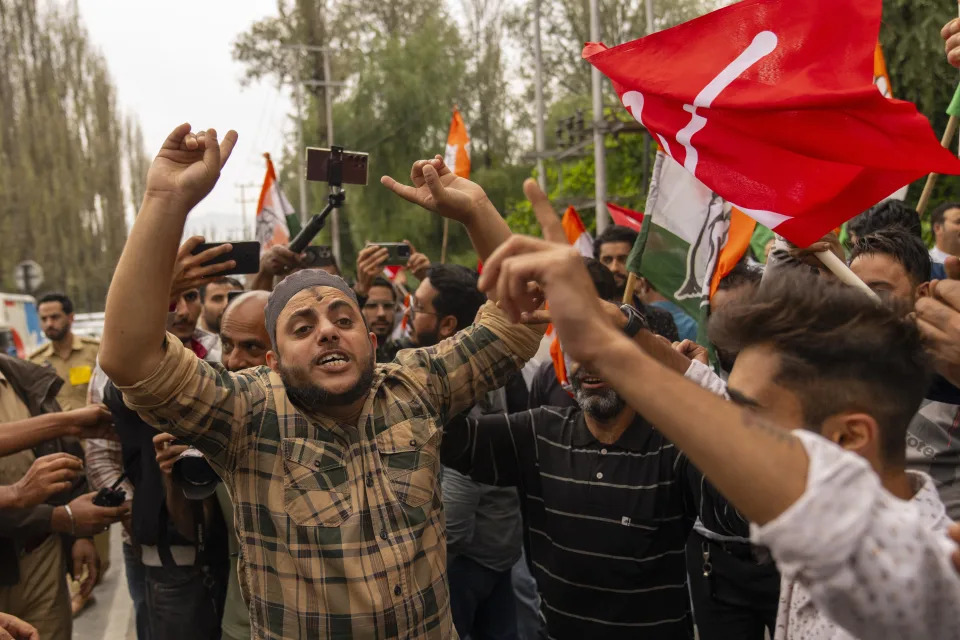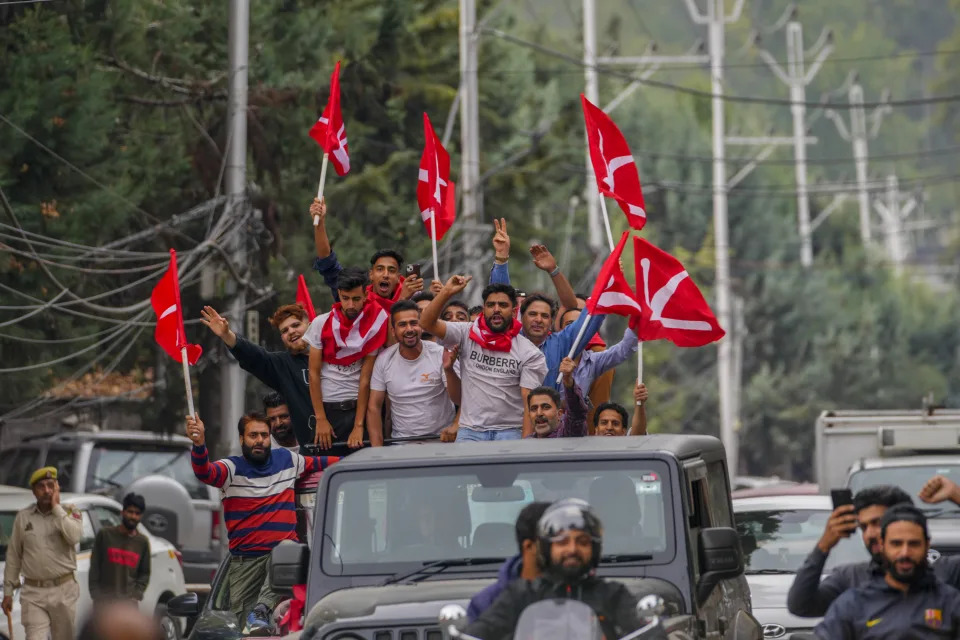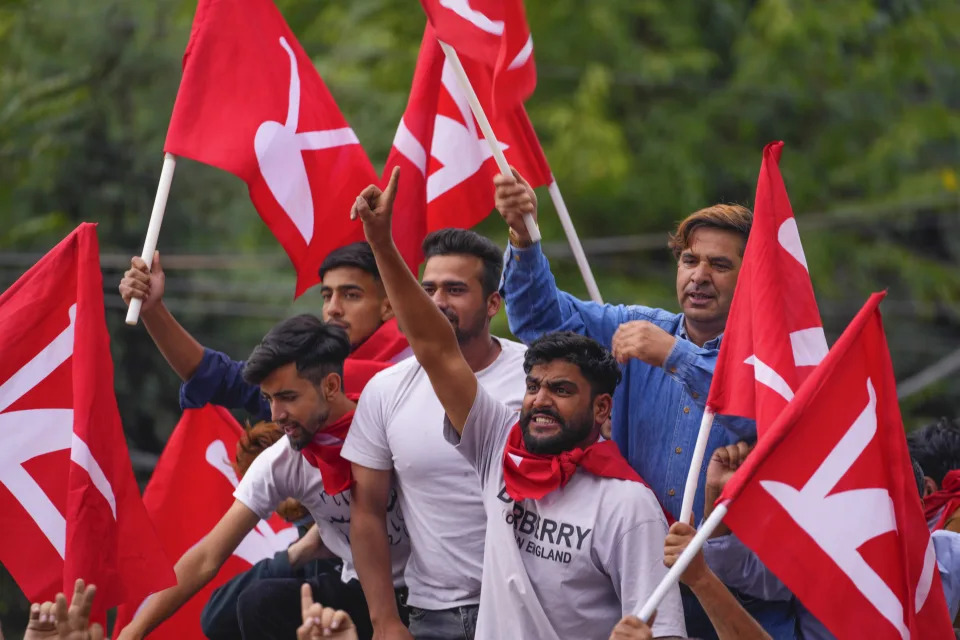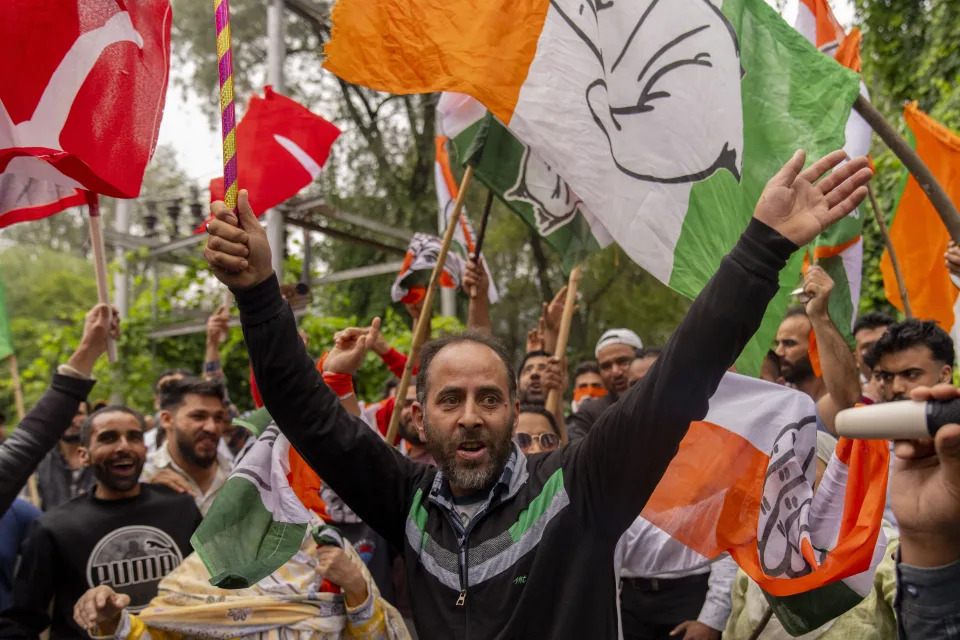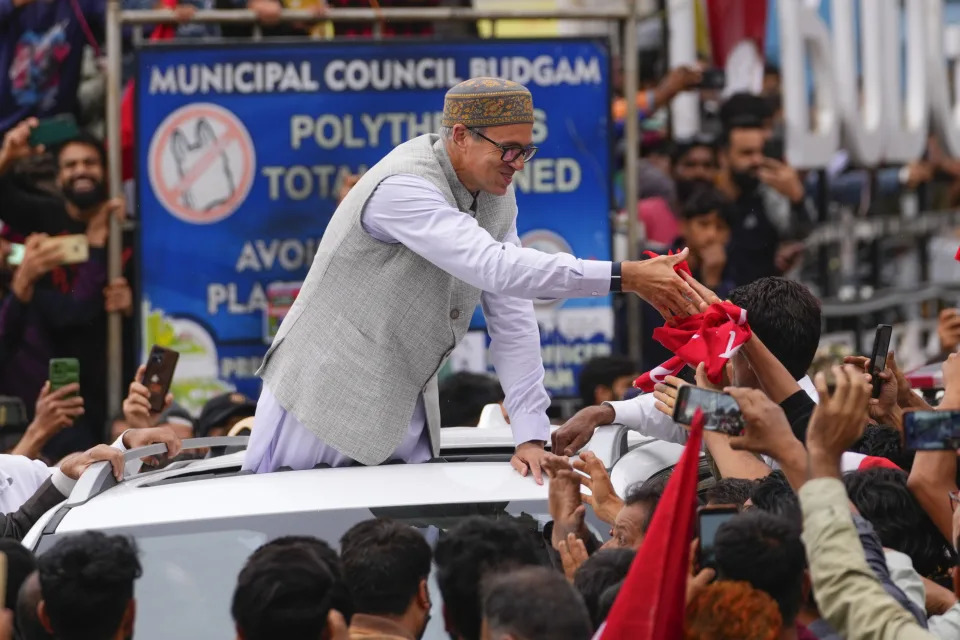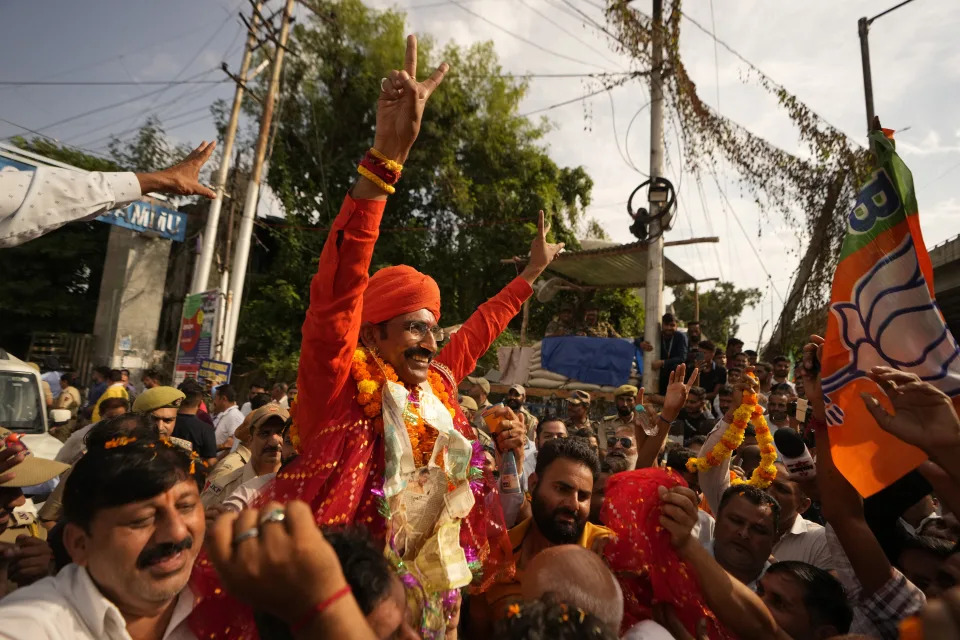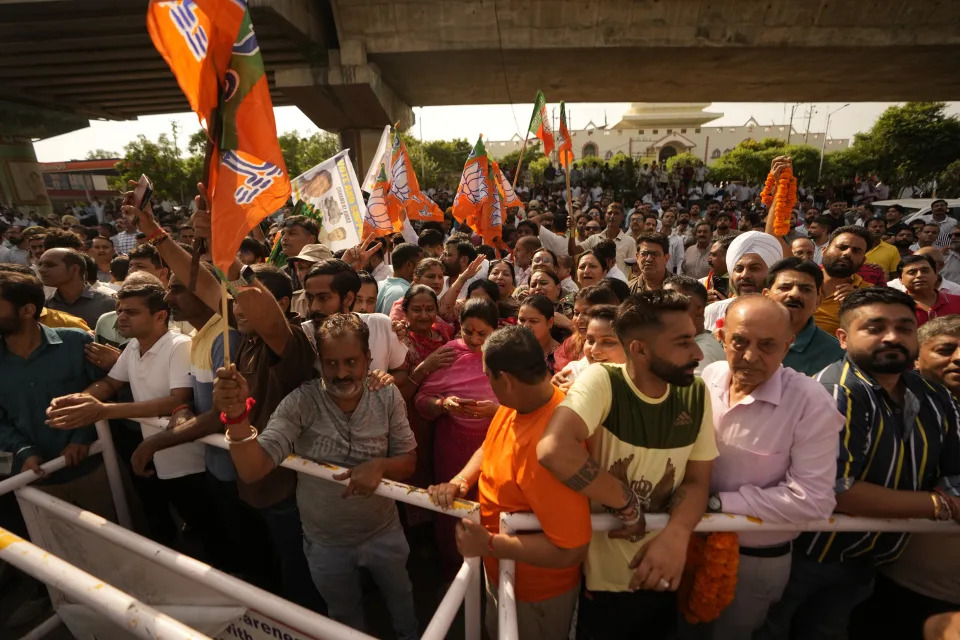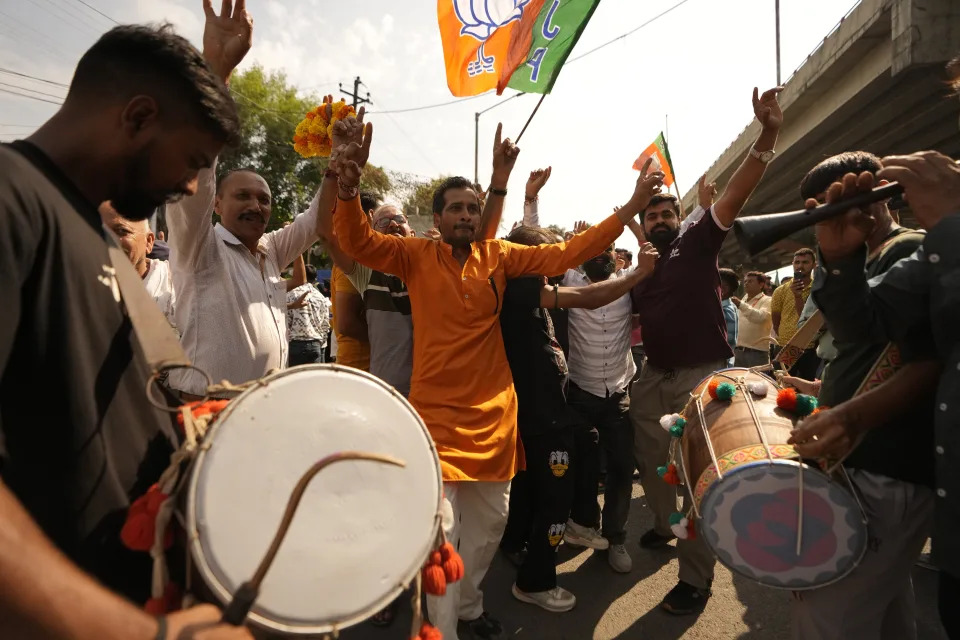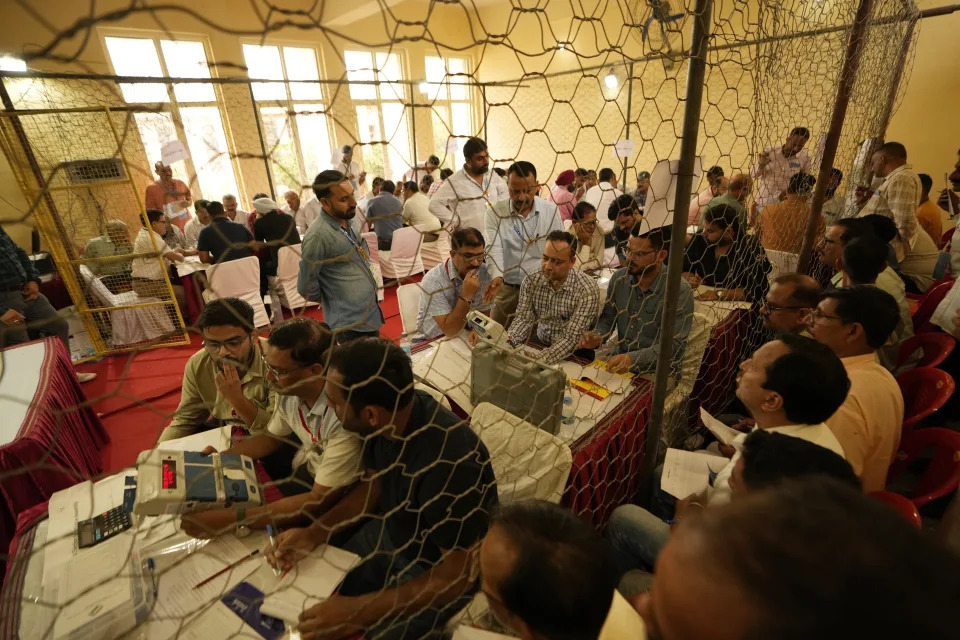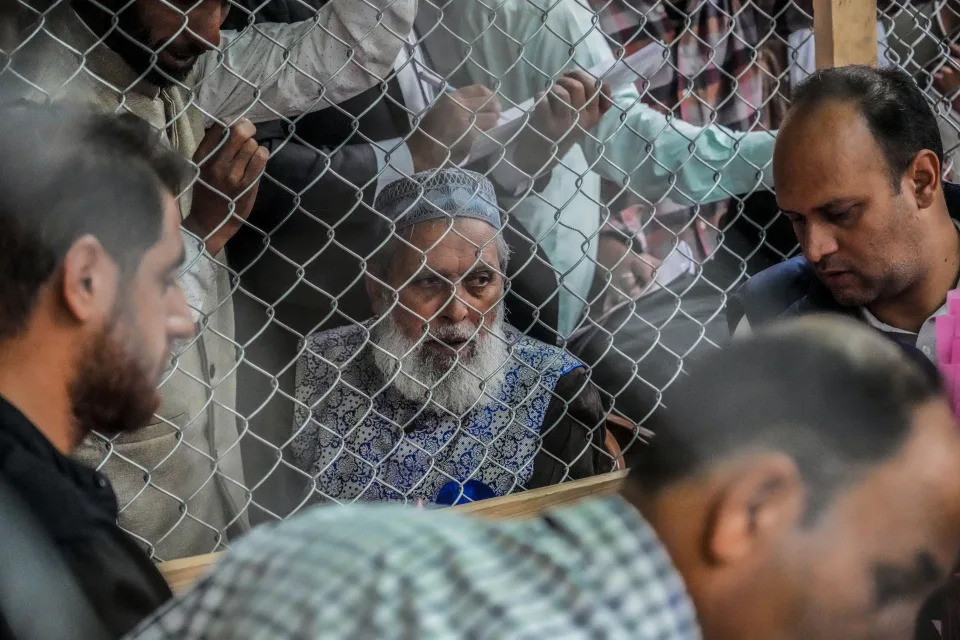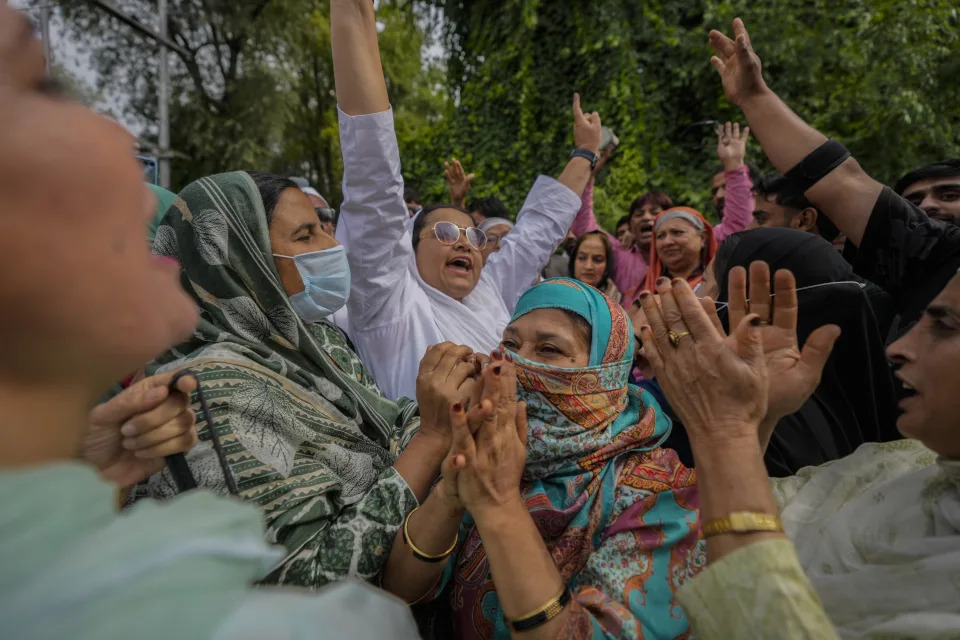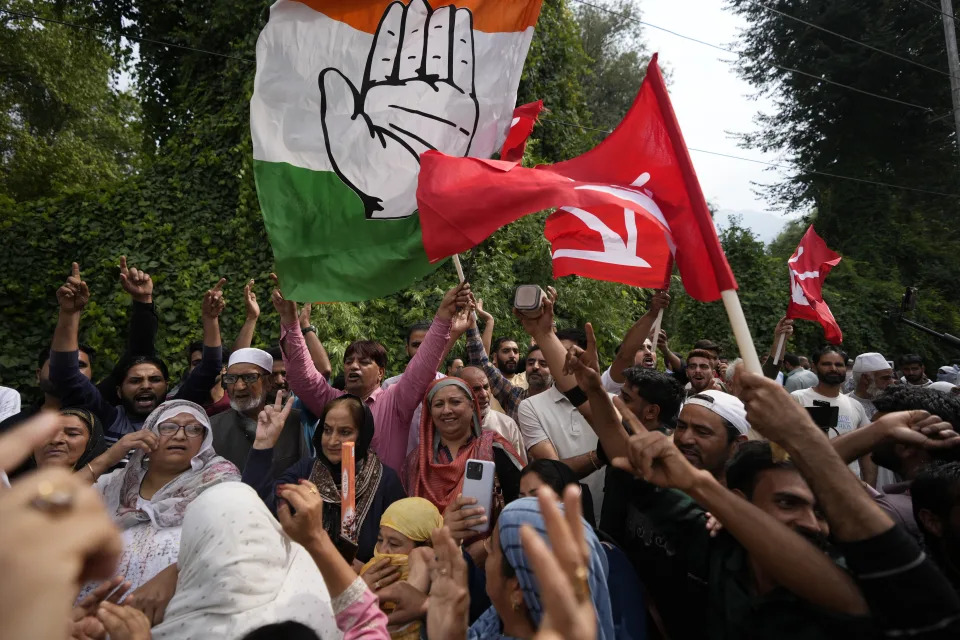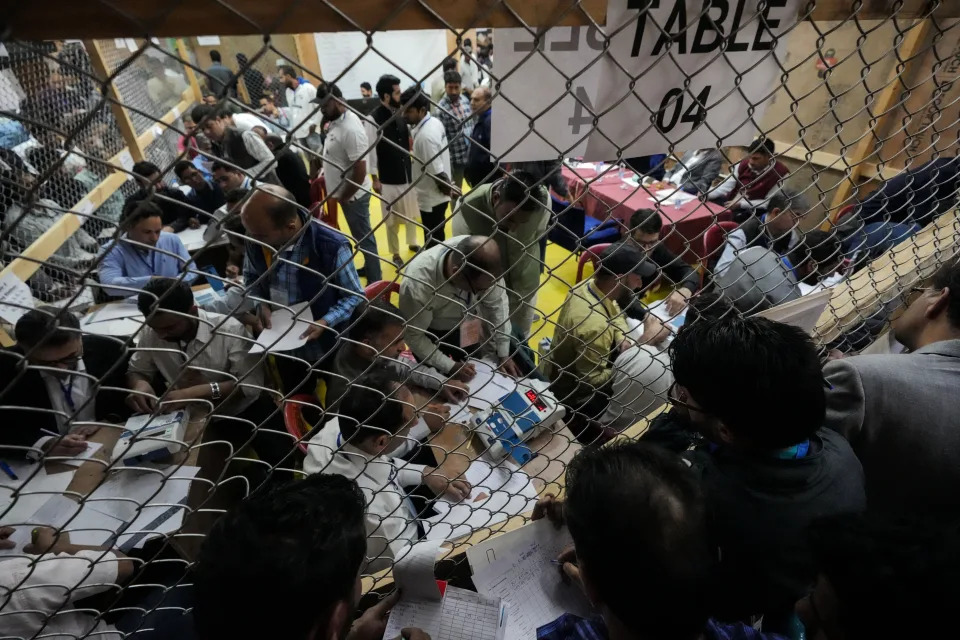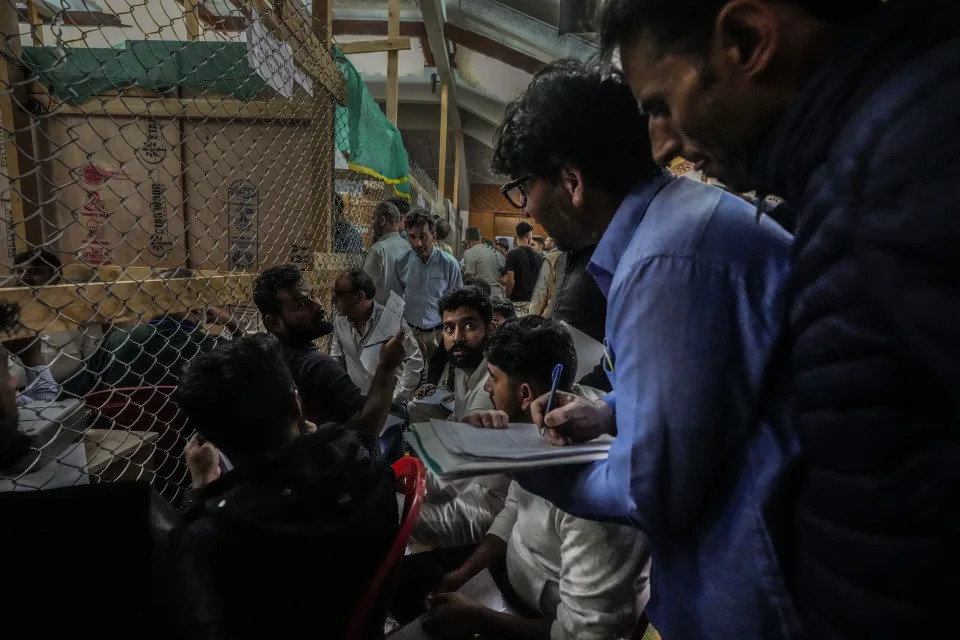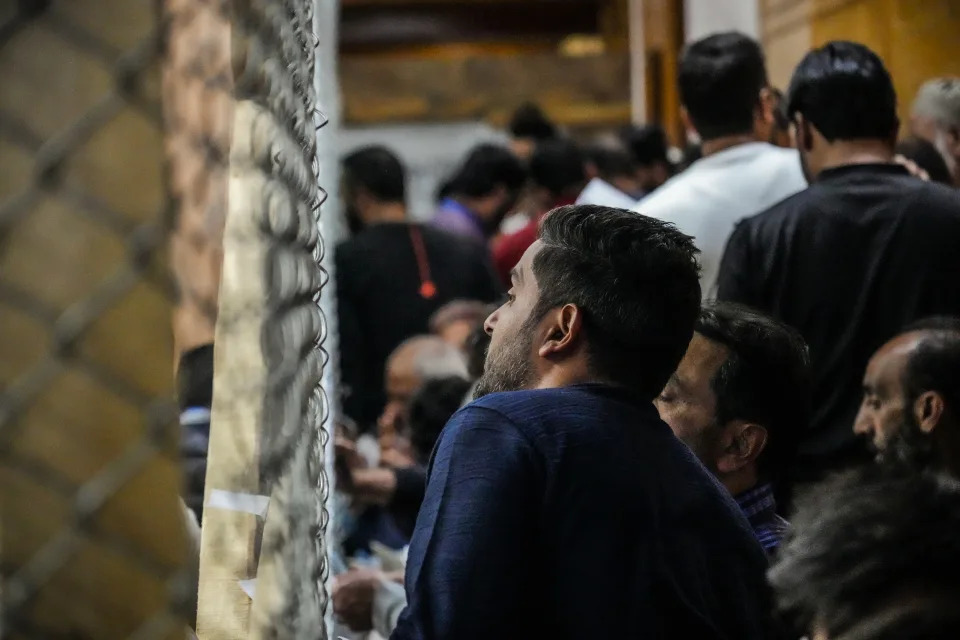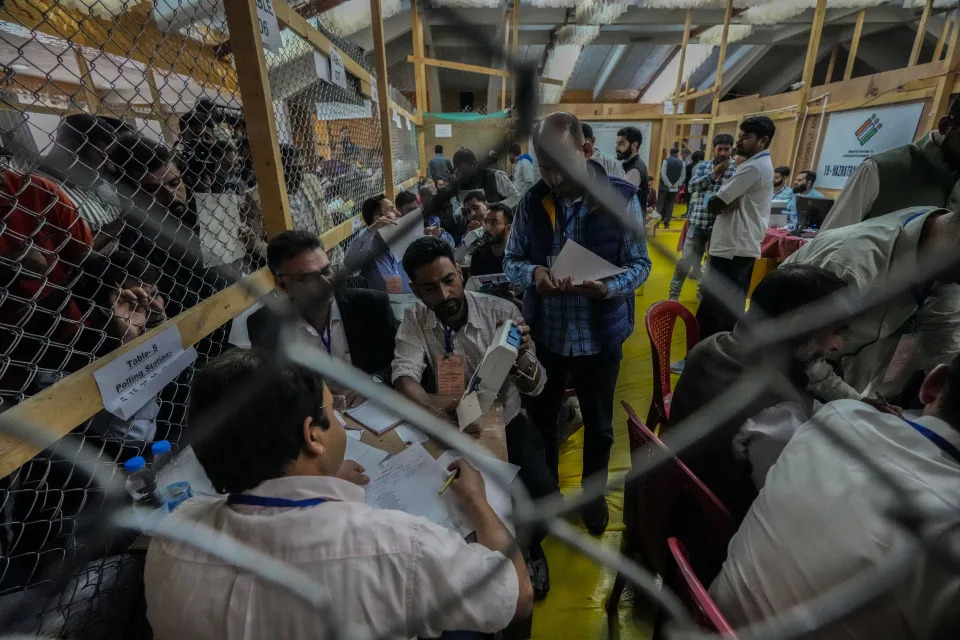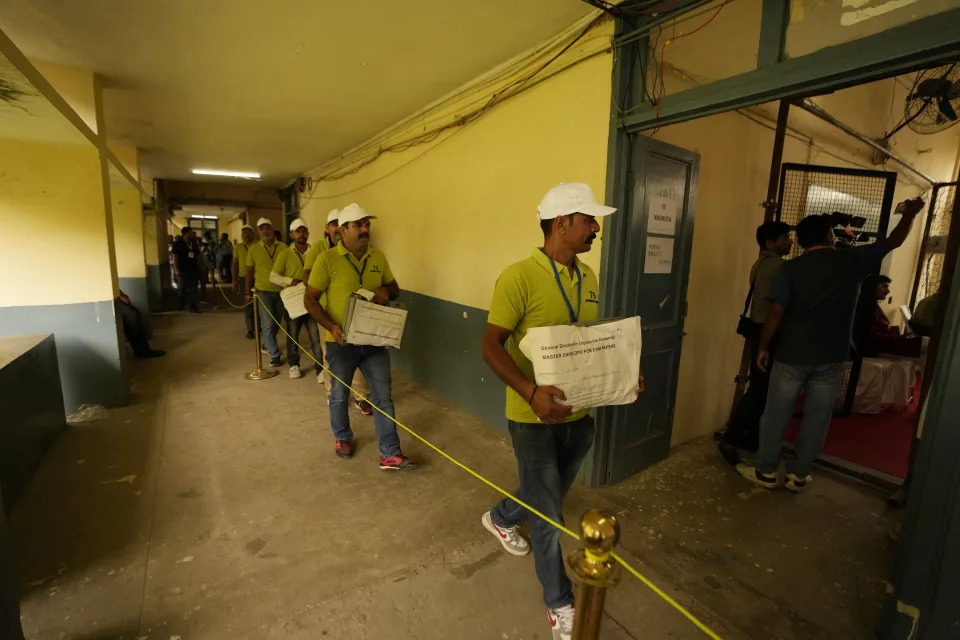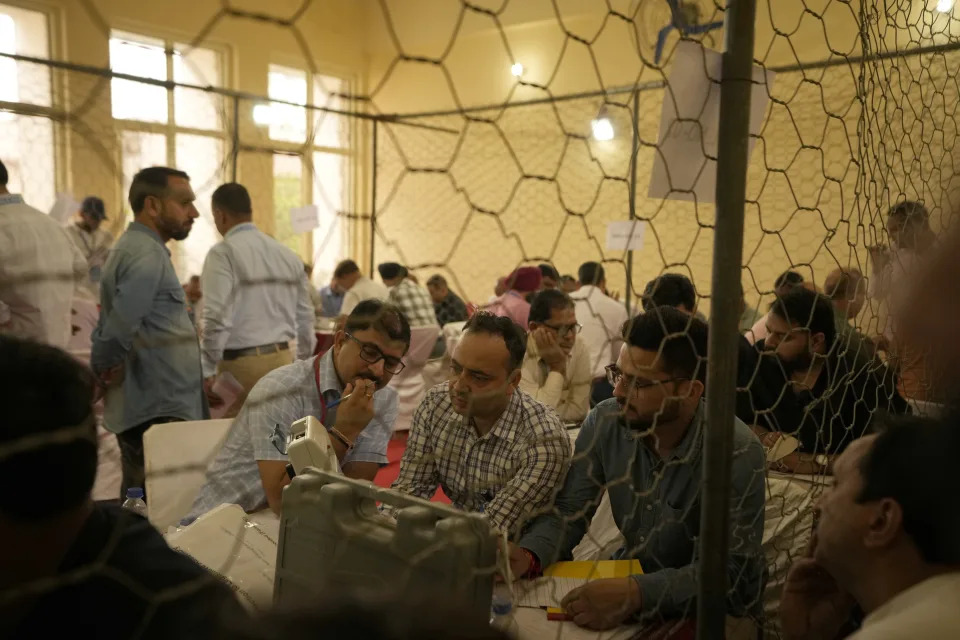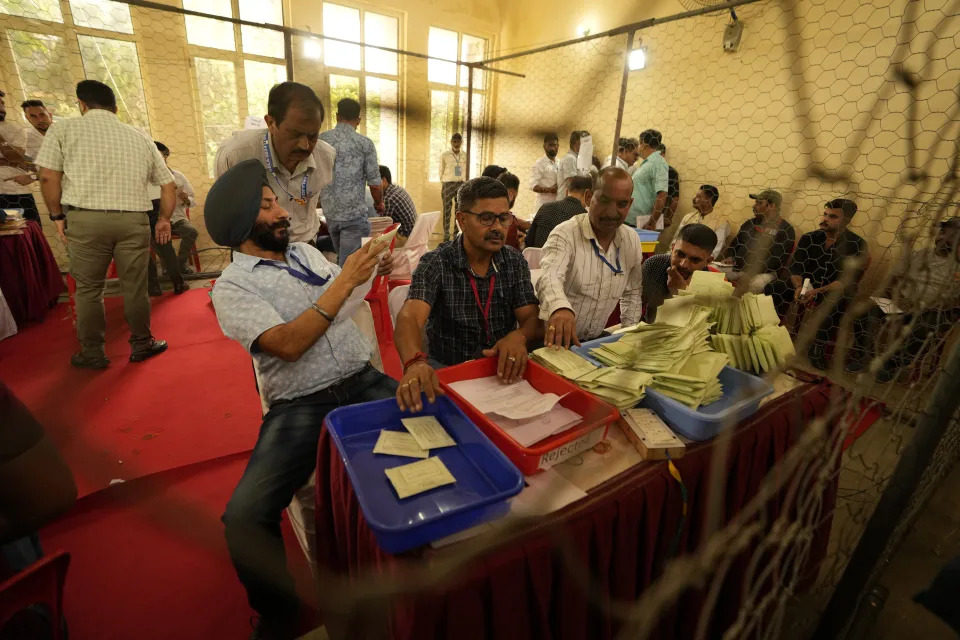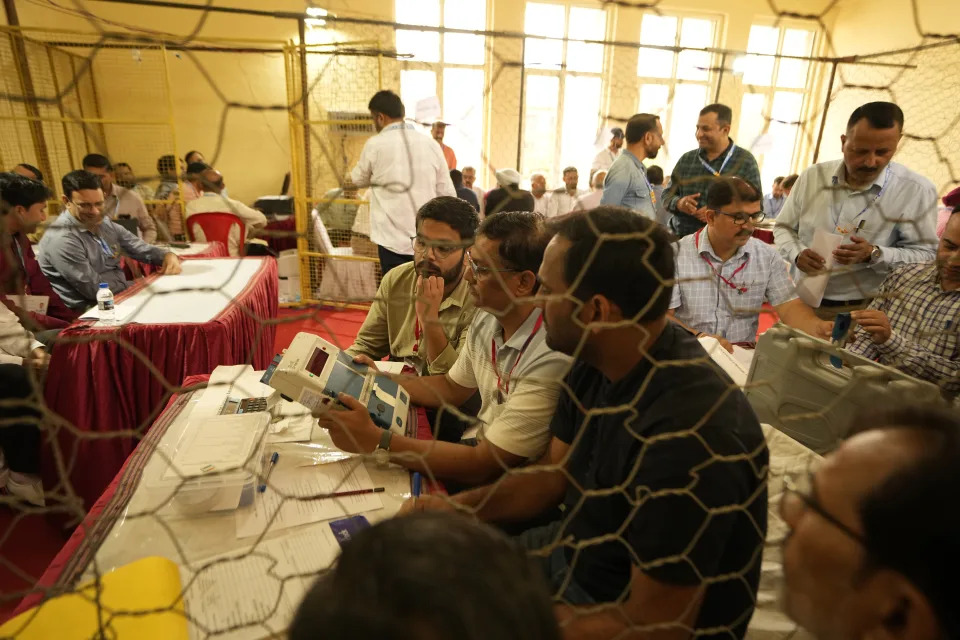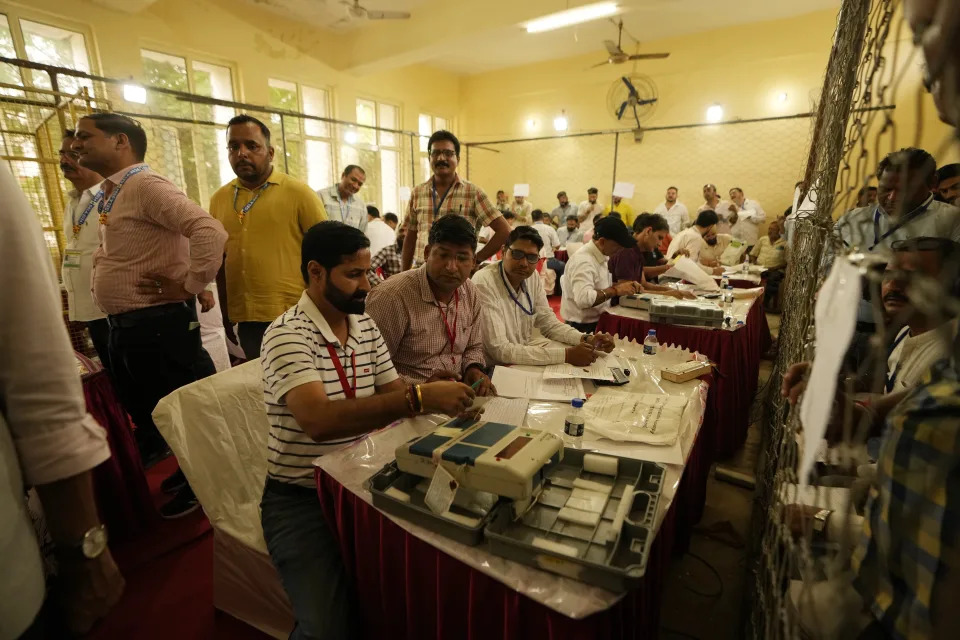Issam AHMED
Tue, October 8, 2024
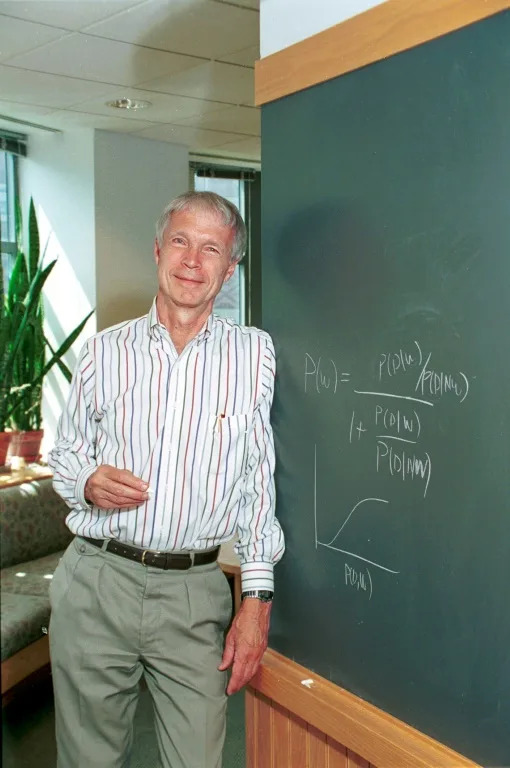
John Hopfield was honored for devising the 'Hopfield network' — a theoretical model demonstrating how an artificial neural network can mimic the way biological brains store and retrieve memories (Denise APPLEWHITE) (Denise APPLEWHITE/PRINCETON UNIVERSITY/AFP)
A US scientist who won the 2024 Nobel physics prize for his pioneering work on artificial intelligence said Tuesday he found recent advances in the technology "very unnerving" and warned of possible catastrophe if not kept in check.
John Hopfield, a professor emeritus at Princeton, joined co-winner Geoffrey Hinton in calling for a deeper understanding of the inner workings of deep-learning systems to prevent them from spiraling out of control.
Addressing a gathering at the New Jersey university via video link from Britain, the 91-year-old said that over the course of his life he had watched the rise of two powerful but potentially hazardous technologies -- biological engineering and nuclear physics.
"One is accustomed to having technologies which are not singularly only good or only bad, but have capabilities in both directions," he said.
"And as a physicist, I'm very unnerved by something which has no control, something which I don't understand well enough so that I can understand what are the limits which one could drive that technology."
"That's the question AI is pushing," he continued, adding that despite modern AI systems appearing to be "absolute marvels," there is a lack of understanding about how they function, which he described as "very, very unnerving."
"That's why I myself, and I think Geoffrey Hinton also, would strongly advocate understanding as an essential need of the field, which is going to develop some abilities that are beyond the abilities you can imagine at present."
Hopfield was honored for devising the "Hopfield network" -- a theoretical model demonstrating how an artificial neural network can mimic the way biological brains store and retrieve memories.
His model was improved upon by British-Canadian Hinton, often dubbed the "Godfather of AI," whose "Boltzmann machine" introduced the element of randomness, paving the way for modern AI applications such as image generators.
Hinton himself emerged last year as a poster child for AI doomsayers, a theme he returned to during a news conference held by the University of Toronto where he serves as a professor emeritus.
"If you look around, there are very few examples of more intelligent things being controlled by less intelligent things, which makes you wonder whether when AI gets smarter than us, it's going to take over control," the 76-year-old told reporters.
- Civilizational downfall -
With the meteoric rise of AI capabilities -- and the fierce race it has sparked among companies -- the technology has faced criticism for evolving faster than scientists can fully comprehend.
"You don't know that the collective properties you began with are actually the collective properties with all the interactions present, and you don't therefore know whether some spontaneous but unwanted thing is lying hidden in the works," stressed Hopefield.
He evoked the example of "ice-nine" -- a fictional, artificially engineered crystal in Kurt Vonnegut's 1963 novel "Cat's Cradle" developed to help soldiers deal with muddy conditions but which inadvertently freezes the world's oceans solid, causing the downfall of civilization.
"I'm worried about anything that says... 'I'm faster than you are, I'm bigger than you are... can you peacefully inhabit with me?' I don't know, I worry."
Hinton said it was impossible to know how to escape catastrophic scenarios at present, "that's why we urgently need more research."
"I'm advocating that our best young researchers, or many of them, should work on AI safety, and governments should force the large companies to provide the computational facilities that they need to do that," he added.
Nilima Marshall, PA Science Reporter
Tue, October 8, 2024

A British-Canadian computer scientist who warned that artificial intelligence (AI) could pose an existential threat to humanity has been awarded this year’s Nobel Prize in Physics.
Professor Geoffrey Hinton, often touted as the “godfather of AI”, shares the honour with US academic John Hopfield for their pioneering work on machine learning, which powers AI.
The announcement was made by the Royal Swedish Academy of Sciences at a press conference in Stockholm, Sweden.
Prof Hinton, 76, who has warned about the dangers of intelligent machines, said he was “flabbergasted”, adding: “I had no idea this would happen. I’m very surprised.”
The University of Toronto professor resigned from Google last year, saying he was worried about the “existential risk” posed by machines that could outsmart humans.
Speaking on the phone at the event in Stockholm, Prof Hinton described the call about being awarded the Nobel as a “bolt from the blue”, saying: “I am in a cheap hotel in California that does not have an internet connection and does not have a very good phone connection.
“I was going to get an MRI scan today, but I think I’ll have to cancel that.”
Machine learning is a key component of AI which allow machines to perform tasks that mimic human intelligence, such as learning, reasoning, and problem solving.
The impact of AI can be seen in every aspect of human lives, from uncovering hidden cancers and editing photos on phones to powering systems such as ChatGPT.
Prof Hinton, who shares a prize fund worth 11m Swedish kronor (£810,000) with Prof Hopfield of Princeton University, said artificial intelligence will have a “huge influence” on humanity that could be comparable with the Industrial Revolution – a period of scientific and technological development in the 18th century.
He added: “But instead of exceeding people in physical strength, it (AI) is going to exceed people in intellectual ability.
“We have no experience of what it is like to have things smarter than us, and it is going to be wonderful in many respects.”
Prof Hinton said that in areas like healthcare, AI will make things “more efficient” with “huge improvements in productivity”.
But he also said he was worried about “a number of possible bad consequences, particularly the threat of these things getting out of control”.
When asked about whether he had any regrets about his groundbreaking work on AI, Prof Hinton said: “There are two kinds of regret – there is regret where you feel guilty because you did something you knew you should not have done, and then then there is regret where you did something that you would do again in the same circumstances.”
He said that he “would do the same again” but was “worried that the overall consequence of this might be systems more intelligent than us that eventually take control”.
Prof Hinton said he uses Chat GPT 4 “whenever I want to know the answer to anything”, but he does not usually trust the chatbot, “because it can hallucinate”.
Commenting on the announcement, Professor Sir Keith Burnett, president of the Institute of Physics, said: “Congratulations to John J Hopfield and Geoffrey E Hinton for winning the Nobel Prize in Physics today.
“It is incredibly exciting to see key ideas and techniques in Physics helping to drive new ways to model and understand the wider world and machine learning is undoubtedly one of the transformational technologies of the future.
“Their work with artificial neural networks is contributing to a whole new generation of smarter, faster and more adaptable processing and thinking systems, which could transform all of our lives.”
Meric Gertler, preseident of the University of Toronto, said: “On behalf of the University of Toronto, I am absolutely delighted to congratulate University Professor Emeritus Geoffrey Hinton on receiving the 2024 Nobel Prize in Physics.
“The U of T community is immensely proud of his historic accomplishment.”
Ellen Moons, a member of the Nobel committee at the Royal Swedish Academy of Sciences, said the pair “used fundamental concepts” from physics to “design artificial neural networks” that have “become part of our daily lives, for instance in facial recognition and language translation”.
AI pioneers John Hopfield and Geoffrey Hinton win Nobel Prize in physics
Gabriela Galvin
Tue, October 8, 2024 at 3:52 AM MDT·3 min read
Artificial intelligence pioneers John Hopfield and Geoffrey Hinton won the 2024 Nobel Prize in Physics for discoveries that enabled machine learning with artificial neural networks and set the scene for today’s breakthroughs in AI.
Hans Ellegren, secretary general of the Royal Swedish Academy of Sciences, awarded the prize Tuesday in Stockholm.
Hopfield, who carries out research at Princeton University in the United States, is known for creating a network in 1982 that can retain and recreate patterns in images and other types of data by identifying the values between points, working through them, and updating the missing values.
Now called Hopfield networks, they can be used to recognise images, correct mistakes, and optimise functions in computer science.
In 1985, Hinton, a computer scientist at the University of Toronto in Canada who is known as the “godfather of AI,” used the Hopfield network to create a new model. After being fed examples, the network – called the Boltzmann machine – can recognise characteristics in data and use that to identify specific elements in images or other patterns.
Hopfield and Hinton’s work, which relied on tools and concepts from physics, set the groundwork for modern machine learning.
“The laureates’ discoveries and inventions form the building blocks of machine learning that can aid humans in making faster and more reliable decisions, for instance when diagnosing medical conditions,” Ellen Moons, chair of the Nobel Committee for Physics, said.
Speaking to journalists, Hinton said that AI-driven advancements will be “comparable with the Industrial Revolution, but instead of exceeding people in physical strength, it’s going to exceed people in intellectual ability”.
That could come with incredible societal benefits, but also “the threat of these things getting out of control,” Hinton said.
Hinton spent a decade working on AI at Google before resigning last year, joining a growing chorus of ex-tech employees to warn about the potential dangers of these systems.
Related
‘Godfather of AI’ Geoffrey Hinton quits Google to warn over the tech’s threat to humanity
Asked about the common AI tools he uses, Hinton said he’s a fan of the chatbot ChatGPT – but with some caveats.
"I actually use GPT-4 quite a lot,” Hinton said. “Whenever I want to know the answer to anything, I just go and ask GPT-4. I don't totally trust it cause it can hallucinate, but on almost everything, it's a not-very-good expert, and that's very useful".
Nobel Prizes through the years
The Nobel Prizes were created by Swedish inventor Alfred Nobel, who died in 1896. It comes with a cash award of 11 million Swedish kroner, which is nearly €976,000.
From 1901 to 2023, 117 Nobel Prizes were awarded in Physics. The youngest of the 225 laureates was 25, while the oldest was 96.
Last year’s physics award went to Pierre Agostini from Ohio State University in the United States, Ferenc Krausz from the Max Planck Institute of Quantum Optics in Germany, and Anne L’Huillier from Lund University in Sweden.
The trio found a way to create extremely short pulses of light that can be used to measure how the electrons inside atoms and molecules move or change energy.
Related
Quantum dots, mRNA, and attoseconds: What are the discoveries behind the 2023 science Nobel Prizes?
On Monday, American scientists Victor Ambros and Gary Ruvkun won the Nobel Prize in Physiology or Medicine for their discovery of microRNA, tiny RNA molecules that govern how genes are regulated.
The rest of the 2024 prizes, awarded for advancements in chemistry, economics, literature, and toward peace, will be announced throughout this and next week.
The Nobel laureates will receive their prizes at an awards ceremony in Sweden in December.
Noah Haggerty
Tue, October 8, 2024 a
Professor John Hopfield, left, of Princeton University, and professor Geoffrey Hinton, of the University of Toronto, won the 2024 Nobel Prize winners in Physics. (Associated Press)
On Tuesday morning, Princeton University professor John Hopfield and University of Toronto professor Geoffrey Hinton won the Nobel Prize in Physics 2024 for their foundational discoveries and inventions that pioneered modern artificial intelligence.
Hopfield joined Caltech as faculty in 1980 and, two years later, published his seminal paper in which he applied principles of the brain to computer circuits, creating a neural network able to hold memory and recognize patterns.
Building off of Hopfield's network, Hinton created a model that could not only distinguish between different patterns or images, but generate new ones altogether. His development later landed him a job at Google after the tech giant bought his company.
"These artificial neural networks have been used to advance research across physics topics as diverse as particle physics, material science and astrophysics," said Ellen Moons, chair of the Nobel Committee for Physics, at the announcement. "The laureates' discoveries and inventions form the building blocks of machine learning."
Read more: Sex, radiation and mummies: How farms are fighting a pesky almond moth without pesticides
The researchers will split a prize of roughly $1 million.
Hopfield was recruited to Caltech in 1978 after the university appointed a new president with a background in physics.
After years of attempting to model the human brain, Hopfield finally made his breakthrough in early 1980. He called Caltech a "splendid environment" for testing out his various ideas.
Around the same time, Hinton had left UC San Diego for Carnegie Mellon in Pittsburgh, where he developed his model based on Hopfield's.
Called the Boltzmann machine, the model formed the basis of current generative AI models like ChatGPT (the "G" stands for "generative").
Read more: Are tiny black holes zipping through our solar system? Scientists hope to find out
Hinton and two of his students created a company based on the research in 2012, focused on using AI to identify common objects in photos, like flowers and dogs. Shortly after, Google bought it at auction for $44 million.
Hinton quit his job at the tech giant in 2023 so he could publicly voice concerns about the technology he helped invent.
He fears people will no longer be able to distinguish AI-generated images and videos from real ones and opposes the use of AI on the battlefield. Hinton said a part of him regrets his life's work.
This story originally appeared in Los Angeles Times.
Tue, October 8, 2024

The announcement was made in Stockholm, Sweden [Getty Images]
The Nobel Prize in Physics has been awarded to two scientists, Geoffrey Hinton and John Hopfield, for their work on machine learning.
British-Canadian Professor Hinton is sometimes referred to as the "Godfather of AI" and said he was flabbergasted.
He resigned from Google in 2023, and has warned about the dangers of machines that could outsmart humans.
The announcement was made by the Royal Swedish Academy of Sciences at a press conference in Stockholm, Sweden.
American Professor John Hopfield, 91, is a professor at Princeton University in the US, and Prof Hinton, 76, is a professor at University of Toronto in Canada.
Machine learning is key to artificial intelligence as it develops how a computer can train itself to generate information.
It drives a vast range of technology that we use today from how we search the internet to editing photographs on our phones.
“I had no idea this would happen. I'm very surprised,” said Prof Hinton, speaking on the phone to the Academy minutes after the announcement.
He said he was in a hotel with bad internet in California and thought he might need to cancel the rest of his day's plans.
The Academy listed some of the crucial applications of the two scientists’ work, including improving climate modelling, development of solar cells, and analysis of medical images.

Geoffrey Hinton said on Tuesday that he uses ChatGPT4 [Getty Images]
Prof Hinton's pioneering research on neural networks paved the way for current AI systems like ChatGPT.
In artificial intelligence, neural networks are systems that are similar to the human brain in the way they learn and process information. They enable AIs to learn from experience, as a person would. This is called deep learning.
Prof Hinton said his work on artificial neural networks was revolutionary.
“It’s going to be like the Industrial Revolution - but instead of our physical capabilities, it’s going to exceed our intellectual capabilities," he said.
But he said he also had concerns about the future. He was asked if he regretted his life's work as he told journalist last year.
In reply, he said he would do the same work again, "but I worry that the overall consequences of this might be systems that are more intelligent than us that might eventually take control".
He also said he uses the AI chatbot ChatGPT4 for many things now but with the knowledge that it does not always get the answer right.
Professor John Hopfield invented a network that can save and recreate patterns.
It uses physics that describes a material’s characteristics due to atomic spin.
In a similar way to how the brain tries to recall words by using associated but incomplete words, Prof Hopfield developed a network that can use incomplete patterns to find the most similar.
The Nobel Prize committee said the two scientists' work has become part of our daily lives, including in facial recognition and language translation.
But Ellen Moons, chair of the Nobel Committee for Physics, said "its rapid development has also raised concerns about our future collectively".
The winners share a prize fund worth 11m Swedish kronor (£810,000).
AI chatbots 'may soon be more intelligent than us'
AI-created drug to be used on humans for first time
When Prof Hinton resigned from Google last year, he told the BBC some of the dangers of AI chatbots were "quite scary".
He also said at the time that his age had played into his decision to leave the tech giant.
Earlier this year, in an interview with BBC Newsnight, he said the UK government will have to establish a universal basic income to deal with the impact of AI on inequality, as he was “very worried about AI taking lots of mundane jobs”.
He added that while AI would increase productivity and wealth, the money would go to the rich “and not the people whose jobs get lost and that’s going to be very bad for society”.
In the same interview, he said developments over the last year showed governments were unwilling to rein in military use of AI while the competition to develop products rapidly meant there was a risk tech companies wouldn't “put enough effort into safety”.
Prof Hinton said "my guess is in between five and 20 years from now there’s a probability of half that we’ll have to confront the problem of AI trying to take over".
Previous winners of the Nobel Prize in Physics
2023 - Pierre Agostini, Ferenc Krausz and Anne L'Huillier for work on attoseconds - extremely short pulses of light that can be used to capture and study rapid processes inside atoms;
2022 - Alain Aspect, American John Clauser and Austrian Anton Zeilinger for research into quantum mechanics - the science that describes nature at the smallest scales;
2021 - Syukuro Manabe, Klaus Hasselmann and Giorgio Parisi were given the prize for advancing our understanding of complex systems, such as Earth's climate;
2020 - Sir Roger Penrose, Reinhard Genzel and Andrea Ghez received the prize for their work on the nature of black holes;
2019 - James Peebles, Michel Mayor and Didier Queloz shared the prize for ground-breaking discoveries about the Universe;
2018 - Donna Strickland, Arthur Ashkin and Gerard Mourou were awarded the prize for their discoveries in the field of laser physics.
AI chatbots 'may soon be more intelligent than us'
Two artificial intelligence leaders win physics Nobel Prize
Clyde Hughes
Tue, October 8, 2024 at 6:50 AM MDT·2 min read

Professor Anders Irback speaks at a press conference at the Royal Swedish Academy of Sciences after announcing the winners of the 2024 Nobel Prize in Physics, in Stockholm, Sweden, on Tuesday to John J. Hopfield and Geoffrey E. Hinton. Photo by Christine Olsson/EPA-EFE
Oct. 8 (UPI) -- The Nobel Prize in physics was awarded on Tuesday to scientists a pair of scientists hailing from the United States and Canada for their work in artificial intelligence that has become the foundation of powerful machine learning.
The Nobel committee said John Hopfield, of Princeton University, created an associative memory that can store and reconstruct images and other types of patterns in data while Geoffrey Hinton, of the University of Toronto, invented a method that can autonomously find properties in data and perform tasks such as identifying specific elements in pictures.
"The laureates' work has already been of the greatest benefit," Ellen Moons, chair of the Nobel Committee for Physics, said in a statement. "In physics, we use artificial neural networks in a vast range of areas, such as developing new materials with specific properties."
The Nobel Committee said the idea of machine learning using artificial neural networks was inspired by how the human brain works. In the artificial neural network, the brain's neurons are represented by nodes that have different values and influence each other through connections.
"This year's laureates have conducted important work with artificial neural networks from the 1980s onward," the committee said.
The committee said the world is just now coming to recognize how the work of Hopfield and Hinton in laying down some of the crucial foundations of artificial intelligence has shaped the global world and will continue to do so.
"With their breakthroughs, that stand on the foundations of physical science, they have shown a completely new way for us to use computers to aid and to guide us to tackle many of the challenges our society faces," the committee said.
Hinton, known as the "Godfather of AI," made headlines last year when he quit Google to focus on AI threat issues and joined hundreds of tech leaders to sign a statement warning about the risk of AI without the proper guardrails.
Two AI pioneers won the Nobel Prize for their work in machine learning
Britney Nguyen
Tue, October 8, 2024
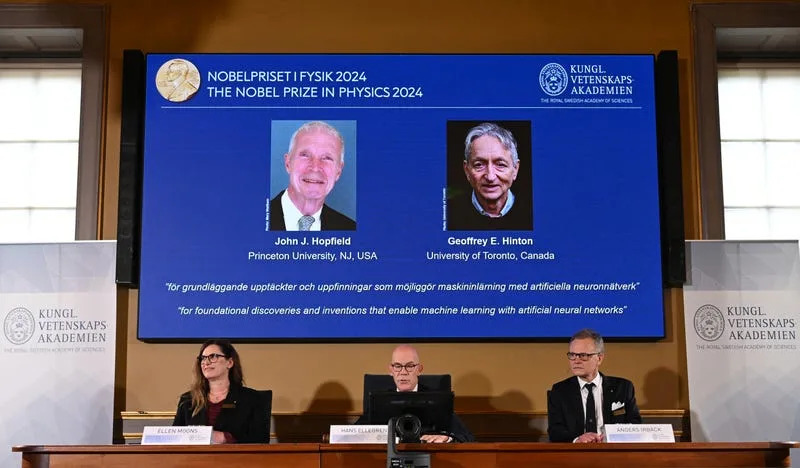
U.S. physicist John J. Hopfield (top L) and Canadian-British computer scientist and cognitive psychologist Geoffrey E. Hinton displayed on a screen at the Royal Swedish Academy of Sciences in Stockholm, Sweden on October 8, 2024. - Photo: JONATHAN NACKSTRAND/AFP (Getty Images)
Two artificial intelligence pioneers were awarded the Nobel Prize for their work in machine learning, which laid the foundation for the current AI boom.
Geoffrey Hinton, also known as the “godfather of AI,” and John Hopfield were named as the 2024 winners of the Nobel Prize in Physics on Tuesday. Hinton and Hopfield, who both started their work in machine learning in the 1980s, were awarded the prize “for foundational discoveries and inventions that enable machine learning with artificial neural networks,” the Royal Swedish Academy of Sciences said in a statement.
Hopfield is known for inventing a network used in machine learning called the “Hopfield network,” which is used for storing and reconstructing images and other patterns in data using physics, according to the Royal Swedish Academy of Sciences. Hopfield’s network was then used by Hinton as the foundation for a new network that uses statistical physics, called the “Boltzmann machine,” which “can learn to recognize characteristic elements in a given type of data,” the Royal Swedish Academy of Sciences said.
“The laureates’ work has already been of the greatest benefit,” Ellen Moons, Chair of the Nobel Committee for Physics, said. “In physics we use artificial neural networks in a vast range of areas, such as developing new materials with specific properties.”
Last May, Hinton left his job on Google’s (GOOGL) AI research team to talk openly about his concerns over the risks of AI.
“I console myself with the normal excuse: If I hadn’t done it, somebody else would have,” Hinton told The New York Times (NYT).
On Tuesday, Hinton said in response to questions about regrets over his work, that he “would do the same again, but I am worried that the overall consequence of this might be systems more intelligent than us that eventually take control,” Bloomberg reported.
Hopfield and Hinton will share the prize of 11 million Swedish kronor, or $1 million.
